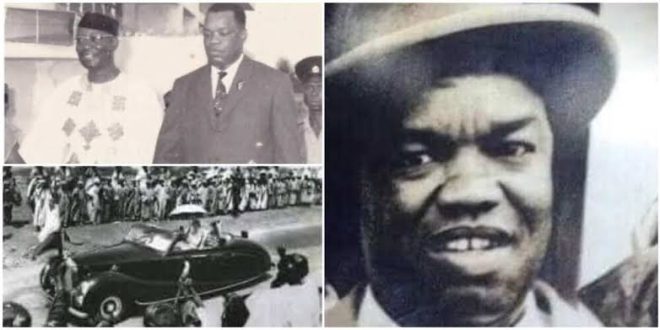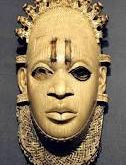
The first billionaire in Nigeria and West Africa was Sir Louis Phillip Odumegwu Ojukwu. He amassed wealth of $14 billion in present-day value from palm oil exportation before diversifying into transportation, textiles, and other ventures.
He was also the founder of the Nigerian Stock Exchange (NSE) and played a pivotal role in Nigeria’s economic and political spheres.
Sir Louis Phillip Odumegwu Ojukwu, OBE, was born in 1909. He hailed from the Ojukwu family of Nwakanwa quarters, Obiuno Umudim Nnewi. Ojukwu’s journey to prominence began with a solid educational foundation. He attended primary school in Asaba and later the Hope Waddell Training Institute. These formative years laid the groundwork for his remarkable career, which spanned various industries and significantly impacted Nigeria’s economic landscape.
Ojukwu’s professional journey started modestly at the Agricultural Department, but his ambition soon led him to join John Holt as a tyre sales clerk. His entrepreneurial spirit was evident even in those early days. To supplement his income, he incorporated a textile company in Onitsha.
However, it was his keen observation of the challenges faced by Eastern textile traders due to inadequate transportation that sparked his most significant venture. Recognising transportation as a critical need, Ojukwu established Ojukwu Transport Limited, the first major transport company to facilitate the movement of Easterners to Lagos from the Asaba end of the Niger River.
The economic boom following World War II provided fertile ground for Ojukwu’s transport business to flourish. Collaborating with the West African Railway Company and the newly formed produce boards, Ojukwu offered his fleet for commodity transportation, significantly improving the trading environment for Nigerian traders. His transport company not only moved goods but also played a crucial role in the distribution network across Nigeria.
During the 1950s, Ojukwu diversified his business interests. He ventured into various industries, invested heavily in real estate, and secured directorship positions in numerous major corporations, including the state-owned Nigerian National Shipping Line, Nigerian Cement Factory, Nigerian Coal Corporation, and Shell Oil Nigeria Limited. His business acumen and strategic investments cemented his reputation as a key player in Nigeria’s economic development.
Ojukwu’s influence extended beyond the business realm. He was instrumental in establishing several significant institutions in Nigeria. Notably, he was the founding president of the Nigerian Stock Exchange, a pivotal platform for the country’s financial growth. Additionally, he served as the president of the
African Continental Bank, further demonstrating his leadership in the financial sector.
His board memberships and chairmanships in some of Nigeria’s most profitable companies, such as Guinness Nigeria Limited and John Holt plc, showcased his ability to steer organisations toward success.
Ojukwu’s business strategies and leadership were not confined to private enterprises; he also contributed to public corporations, exemplifying his commitment to Nigeria’s overall economic progress.
Ojukwu’s success in business naturally led to his involvement in politics. He was an active member and donor to the National Council of Nigeria and the Cameroons (NCNC), a political party led by prominent figures like Nnamdi Azikiwe. His political career saw him win a parliamentary seat during Nigeria’s First Republic, highlighting his influence in the country’s political landscape.
In 1953, Ojukwu was appointed head of an NCNC peace committee, tasked with restoring peace in the regional House of Assembly.
His approach to policy was characterised by a blend of capitalism and a moderate right-wing stance, distinguishing him from Azikiwe’s socialist undertones. His contributions to political discourse were significant. He co-authored a report on the Economic Mission to Europe and North America with Azikiwe, recommending the investment of extra funds from the produce marketing board in regional banks and public corporations to stimulate economic development.
Ojukwu’s contributions to Nigeria’s economic and political spheres did not go unnoticed. Throughout World War II and the years following, his transport company played a crucial role in moving goods and supplies, including for the British during the war.
His services were highly valued, and in recognition of his efforts, he was knighted by Queen Elizabeth II. This honour underscored his impact and legacy as a distinguished Nigerian businessman and philanthropist.
Sir Louis Odumegwu Ojukwu’s legacy extended through his family. His son, Chukwuemeka Odumegwu Ojukwu, became a notable figure in Nigerian history as the military governor and later the leader of the secessionist state of Biafra during the Nigerian Civil War.
Sir Louis’s entrepreneurial and political achievements laid a strong foundation for many on Nigeria’s socio-political landscape.
Sir Louis Odumegwu Ojukwu passed away in September 1966, just a year before the outbreak of the Nigerian Civil War. His death marked the end of an era for a man whose vision and leadership had a profound impact on Nigeria’s development.
His contributions to the business world, his role in shaping the Nigerian Stock Exchange, and his active participation in politics remain integral parts of his enduring legacy.
Sir Louis Odumegwu Ojukwu’s life story is a testament to the power of vision, determination, and strategic thinking. From humble beginnings, he rose to become one of Nigeria’s most influential business moguls, shaping the country’s economic landscape through his various ventures.
His contributions to politics and his role in founding key financial institutions demonstrated his multifaceted influence. As Nigeria continues to evolve, the legacy of Sir Louis Odumegwu Ojukwu serves as an inspiration for future generations of entrepreneurs and leaders.
 National Telescope national telescope newspaper
National Telescope national telescope newspaper



